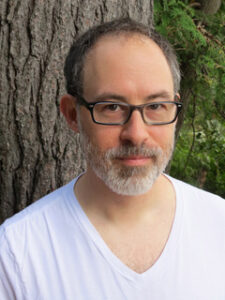The frosting on today’s cupcakes is bluish-grey, the colour of blah—the colour of this moment. But the smells of cinnamon buns, movie popcorn, and French fry oil fill the air and remind me of the verb wafts, so I turn away from the dessert shop and try to forget it’s there. I make my way to a seating area intended for a dozen people, folding my coat over my arm and rubbing the cloth that’s starting to look frayed. Kenny’s running late, but I’m so used to this that it barely irritates me anymore.
Not surprisingly for a Monday afternoon in January, the mall is almost post-apocalyptic in its emptiness, the temperature baking my boots and making me drowsy. I start to build in my mind a backstory about two well-coiffed employees I notice from competing jewelry stores who stand around chatting, half-turned from each other to keep an eye on their respective wares. But I forget all about them when I spot two teenagers heading my way, walking in such pointed silence that I wonder if they’re having a fight. The one on the left, a boy, wears an 80s pompom hat and a T-shirt under his coat with a logo that looks like a rude parody of something other people find meaningful. He carries a ball of cotton candy that’s larger than his head, and as he walks, he breaks off a swath of it with his free hand, crams it into his mouth, and licks each fingertip in turn. The one on the right, a girl who’s a head taller than her friend and whose high bangs possibly indicate an allegiance to some radical subculture, blows a bubblegum bubble until it bursts. They march, eyes unflinchingly ahead as they repeat these motions on an endless loop, lingering at nothing in their path as though following someone’s orders.
As they disappear from my peripheral vision, I wonder if truant officers still exist. I picture uniformed men carrying reinforced butterfly nets, but instead of chasing after stray neighbourhood dogs they scan shopping malls for signs of recalcitrant youth. The image makes the corners of my mouth curve upwards, but what stops the smile in its tracks is the reminder that I haven’t checked my email in thirty-one hours because I don’t want to know anymore what Leila has to say about the state of my dissertation. My phone’s so old that calls and texting are all it can handle, so as long as I don’t go near my battered laptop, her emailed judgment can’t reach me.
I stand when I see Kenny in the distance, unravelling his impossibly long scarf as he approaches. My eyes wander when the teenagers walk past me in the opposite direction, but I make a point of looking at my friend instead.
“Have you been waiting long?” he asks mid-hug, his way of apologizing for being late. He looks nourished and well rested, in a way I’ve come to see as surprisingly unnatural. Then again, he’s in his third year of the Ph.D. program—still in the hopeful stage of dissertation writing—whereas I’ve been around so long that they’ve started calling me a veteran.
We pause in front of the poster for the movie he’s dragged me to see—a live-action reboot of some animated monstrosity from our childhoods that I was slightly too old for but that seems to have filled Kenny’s heart with longing. An image from a sitcom I used to watch during my comparatively carefree undergrad days catches my eye in a nearby calendar booth where everything is 30% off, but after one step in its direction my feet stop of their own volition.
“Thanks for coming with me to see this,” Kenny says. “I felt weird going to this movie by myself, and no one else wanted to watch it with me.” Because of the slight in that remark, I offer no resistance for once when he pays for my ticket.
The snack bar doesn’t sell cotton candy, so I settle for a modest bag of popcorn and a cup of tea because my activist friends would totally give me hell if they found out I’d bought a bottle of water. The movie theatre is empty, so we grab some seats in the exact centre of the room and I feel no shame about draping my coat over the seat next to mine. I vaguely remember the argument I had with my father the day he bought the coat for me, but when I look up at the screen the memory of watching Bugs Bunny cartoons at the movies when I was young surfaces in my mind for some reason, and at least now I understand why Kenny wanted to do this.
He’ll probably want to get coffee later or a bite to eat—which is fine. Maybe I’ll suggest we split one of those cupcakes if that doesn’t seem too misleading. The last time Kenny and I ate together without anyone else as a buffer we spent the whole time talking about the comprehensive exams component of the Ph.D. program, but mine had been so long ago that I didn’t have much advice to offer him except that he should probably brace himself. In the warmth of the movie theatre my head sinks forward momentarily and I see a flash of my childhood home, but whether it’s a memory of the house or of a photo I took before my father sold it is hard to decide.
“You look nice today,” Kenny says, and as I try to rouse myself out of my stupor I notice a look of tenderness in his teddy-bear eyes that makes my hand reach for my tea. Ever since we hooked up a few times last year and I decided I didn’t want to continue doing so, the idea of us remaining friends has been complicated by the fact that there’s no good way I can inquire about his lingering feelings. You’re not still pining for me, are you? Just checking.
“Oh, okay,” I say, even though, with my fisherman’s sweater, plaid shirt, and jeans I’ve worn since high school, I look like Monday afternoon in January at the mall. Thankfully, the two teenagers from earlier choose this moment to enter the theatre and find seats five rows ahead of us. They seem to have made up after their fight, but their heads are turned away from me so I can’t piece together what they’re saying to each other. The boy, having evidently finished his cotton candy, now sports candied rings on all four fingers of his left hand. The colours are so garish that I can identify the flavours from here, and he alternates between giving each ring a lick like that’s his idea of fairness.
“This is fun. I haven’t done this before—gone to the movies on a Monday afternoon,” I say as I stare at the screen and try to get the previews going through the sheer force of my will.
“This isn’t a date, is it?” Kenny says, and even though it’s a negative question, there’s a lilt of hope at the end of it that makes my heart feel like it’s being shredded, like that kid and his cloud of cotton candy.
“No—it isn’t,” I say as the theatre lights finally dim, and since any kind of tact might leave room for misinterpretation, I stuff popcorn into my face to keep from saying more.
◊ ◊ ◊
Kenny insists on staying in his seat until the end of the credits crawl as a way to honour everyone who participated in making what probably qualifies as the worst movie in the history of everything. I’m not in the mood to study the names of the sound recordists or to figure out who played the ambiguous role of “best boy,” so I turn my phone back on even though I don’t expect to discover something from reality that I’ve missed.
Except this time I’m wrong.
I stumble out of the movie theatre, find a quiet corner in the hallway near the water fountain, and dial the department’s number from memory.
“Felicity, it’s Duncan. Is everything okay?”
A breathy sigh cuts through the sound of several people talking animatedly in the background, but I can’t make out who they are or what they’re saying. “Oh, Duncan—I’m sorry to have to tell you the bad news. It’s Leila—I’m afraid she’s passed.”
“Passed what?” I ask, thinking of exams and kidney stones and hockey pucks and legislation and cars in the right lane. This list of options reminds me for some reason of the contest we had at the grad student holiday party last month over who could come up with the most meanings of “to put down” as a transitive verb: to put down a baby, to put down a friend, to put down a cat, to put down a list, to put down a well, to put down a tile, to put down a beat. Then my mind wanders back to its starting point, which it does sometimes. “Oh! You mean she died. Was it—was it her heart?”
“No. She slipped on some ice yesterday outside of Bed, Bath, and Beyond and banged her head.”
“Oh, fuck,” I exclaim as my legs buckle, then bring my free hand to my mouth once it occurs to me that cursing in a conversation with the department assistant might make its way into my file. But Felicity keeps talking as if she hasn’t noticed or cared while I move my hand to support my appendix. “Um—no—I’m not too busy. Why?”
Once I’ve ended the call, I continue to shake all over and clutch my phone so hard I half-expect to hear the sound of plastic cracking. When I turn around, the two teens from before are wandering away and Kenny’s standing in front of me, holding our coats together in an unpleasant swoon. He looks like he wants to hug me after I tell him what happened, so I yank my coat from him and keep it in front of me like a barricade.
Outside, we line up for the next bus heading to the university in response to Felicity’s summons, even though I didn’t shave this morning. It’s once we’ve crossed the threshold from winter wonderland to overheating vehicle that Kenny puts voice to a concern that’s been baking in my head like a cinnamon bun. “What do you think will happen now with your dissertation?” he asks, but I turn away from him and stare out the front window, as if I’m the one who’s in the driver’s seat.
◊ ◊ ◊
My phone doesn’t stop ringing or pinging for the next three days. I receive so many messages of condolence that even trying to change the subject seems like career suicide. A crowd of M.A. students parts like the Red Sea as I make my way down a busy hallway. Felicity includes me in the email chain asking faculty members for feedback on a draft of the obituary for the department website, and while I don’t hear from Leila’s grown children directly, someone forwards me an email from them promising me first dibs on the books and journals in her office. Christine, the department chair, informs me that she and her colleagues decided unanimously at an emergency meeting that, as Leila’s most senior Ph.D. student, I should be the one to recite a poem at her funeral. And when I come across my own name in the list of pallbearers I rush back to the mall and blow what’s left of my savings on a suit because in my case, “I have nothing to wear” is not simply a figure of speech.
Kenny checks in with me often. He starts calling me Dunc again, which probably isn’t a good sign. It’s he who encourages me to go to bed early the night before the funeral and who’s waiting for me in the foyer of the synagogue, spare kippah in hand. When it’s time for me to recite, I find myself resenting the fact that the department vetoed my suggestion of Mary Oliver’s “When Death Comes,” which I’d chosen for the simple reason that it’s the poem I read at my mother’s funeral three years ago and I thought I’d need it to wring some visible emotion out of me. Instead I launch into the department’s choice, John Donne’s old stand-by “Death Be Not Proud,” and when I stumble a little over the line “For those whom thou think’st thou dost overthrow” I try to look mournful instead of irritated.
Once I’m done, I look up for a moment at the crowd of mourners, only a few of whom are visibly upset. My gaze lands on two mid-career professors in my department who normally delight in baiting each other at job talks like it’s some kind of game to them but who now share a funeral program like old friends. Behind them sits one of Leila’s former grad students, who cornered me at a conference banquet last year after one too many gin and tonics and told me to run for my life. My training kicks in as I search for some kind of textual meaning to all this. Is there such a thing as death studies? What are its theories and methods? How does it account for intersecting demographic markers like gender, race, and class? What conclusions does it reach about life and meaning and privilege and oppression and precarity? But I realize I’m lingering at the podium for too long, so I tuck my folded paper back into my jacket pocket and return to my seat. As I glance at Leila’s coffin on display, it dawns on me that this is the last tangible thing I can do for her, and that realization causes me to falter in my steps and to let out a single note that sounds like the midpoint between a sob and a guffaw.
◊ ◊ ◊
I make it through half a plateful of food at the combination reception/shiva held at Christine’s home before the last remaining dregs of energy evaporate from my body and make me yearn for my coat. I make my French leave after establishing that Kenny’s in the middle of an absorbing conversation with the graduate chair out of sight of the front hall, but he ends up chasing after me down the snowy block and linking his arm into mine as though he’s certain that I simply forgot to say goodbye.
It’s only once we’re standing in front of my apartment building that I turn to face him and see the same studied expression on his face I noticed just before we and four other grad students—all of whom are guys I get drunk with—set Leila’s coffin on our shoulders and followed the rabbi outside. The cold has reddened his cheeks, giving him a cherubic look that’s more endearing than sexy, but it melts my heart a little, in spite of the cold. He doesn’t seem to have caught on to the fact that I only ever get naked with other guys when I need a distraction or when I’m trying to feel something, but I invite him downstairs to my one-room apartment anyway. I want to have a friend, and if having a friend means getting naked with him sometimes to make him happy, then maybe that’s a reasonable bargain after all.
I contemplate putting water in the kettle for the sake of appearances, but instead we wordlessly doff our boots and coats and suit jackets and ties and pants and keep going until we’ve peeled off everything that isn’t attached. After we’ve crawled together into my unmade single bed, he pulls the blanket over us while I play with his belly button, my smooth torso contrasting with his hairy one, his toasty skin against mine reminding me that I’m alive.
“What is it you’re not telling me, Dunc?” he asks after we’ve kissed for a while, and because of the way he asks—like he sees something in me that I’ve tried to hide—I realize I have to tell him the truth. I don’t go through the formality of swearing him to secrecy, even though I probably should. Instead, I slink an arm around his waist and explain that Christine told me at the shiva that I’ll have to switch dissertation topics because no one else in the department has Leila’s expertise, but the department will find some emergency funding for me, at least until the end of the summer.
“But that’s good, right?” Kenny says, rubbing my stomach like he’s guessed that doing so gives me comfort. “I mean, as much as it sucks to have to start over—”
As soon as I roll away from him I discover I need even more distance between us, so I rise from the bed and cross the room till I’m leaning against the stove. Naked and shivering, I probably have never been this exposed in my life, which may be why I keep my eye on my bedside lamp to avoid looking at him.
“Kenny, so far my dissertation consists of a working title, an unalphabetized list of sources, a bunch of incoherent scraps in a notebook, and a blinking cursor.”
After a moment in which this evidently sinks in, Kenny sits up abruptly like he’s been catapulted upright, shrugging off the bedspread as he does so. “But you’re in your sixth year,” he says with awe mixed in with something else.
“Seventh.”
“Seventh?” Kenny’s eyes bug out, like I’ve just told him that my ambition is to write a dissertation that’s so long it has to be broken up into seven volumes. “What have you been doing all this time?”
Working for Leila. Grading her papers on the down-low. Doing all the research for her books. Editing her drafts. Ghostwriting the three entries she wrote for the Dictionary of Women Writers and the review article on that new Etty Hillesum biography. Digitizing archival materials. Sitting in front of a microfilm reader all day till my stomach and my eyes begged for mercy. I did all the work on her last collection of essays and in the end she decided to credit me as co-editor, because doing that cost her less than if she’d paid me. Is it any wonder I couldn’t get my own work done? But she didn’t see it that way. She kept pushing and pushing, to the point that I couldn’t think about my dissertation without tentacles of panic reaching up the inside of my throat.
I ponder what would happen if I said any of this out loud, but it turns out I don’t have to, since silence is far more damning than anything I could say. Even with my glasses off, I can see the change on Kenny’s face as he continues to look at me—like the teddy bear knows too much now—like his feelings for me are turning. I fill up the kettle with fresh water but act like I’ve forgotten to turn it on. Instead, I keep my back and my butt turned away from him, even though there isn’t anything particularly interesting for me to look at from this angle except a cupboard door that needs repainting.
I’m thirty-one. I own two pairs of pants and I live in a dungeon. In so many ways I don’t feel like an adult. I’m like those two teenagers from Monday, wandering around the mall all day as a way to hide from the rest of the world. The academic job market sucks and blows so I have nothing to look forward to even if I do finish. But then I feel relieved and guilty, because now this nightmare has ended and I don’t have to act, as well as disloyal—even though Leila felt no loyalty to me. And now they want to give me more money to start over with someone else—a gift I don’t deserve. I can’t figure out what I’m supposed to feel about that, let alone what I’m supposed to do. Should I accept? What do I tell Christine if I turn down her offer and drop out? What do I tell my father, whose finish-what-you-started mantra compensates for the fact that he knows nothing about graduate studies, except that my lack of progress means I can barely afford to keep myself alive?
I turn back when I hear Kenny pushing the covers away and getting up, his inner conflict evident in the contrast between one part of his body that’s furrowing and another part that’s not quite flaccid yet. I wonder momentarily what the protocol is for two friends who get naked in order to talk. Although he approaches me, it’s only to pat my shoulder before he reverses the order of a few minutes ago, starting with his underwear and his socks and ending with his mitts. He says he’ll call me tomorrow, but I don’t bother answering because I know he won’t.
It’s even colder in the apartment now that he’s left. I should probably get dressed, but instead I turn the kettle on, reach inside my school bag, and pull out the sheet of paper I stole from the pile on Leila’s desk when—during what cannot count as my proudest moment—I snuck into her office yesterday morning after I’d read her final email message to me from beyond the grave. It’s the form recommending my withdrawal from the Ph.D. program due to insufficient progress on my dissertation. It has her original signature, so there probably aren’t any copies. I grab a box of matches from my junk drawer, head to the bathroom, and kneel in front of the tub.
I close my eyes and try to conjure Leila in my mind—the way she peered at me through her extravagant glasses as she talked to me—the way most of her emails consisted of bulleted lists because she didn’t have time for frivolous things like salutations or full sentences. Sometimes I hated her; other times she scared me; mostly I felt baffled as to why she never expressed gratitude unless she wanted another favour. But the part of me that’s trained to see things from multiple perspectives remembers how she shoved me out of my grief for my mother with her frantic requests and deadlines. I think about the way she pushed me to do better, to dig deeper, to think harder, even though she was usually referring to my invisible help on her own projects, rather than to the work I was supposed to be doing on mine. I think of the people I started this program with, all of whom graduated or dropped out long ago and from whom I don’t hear much anymore. And when my delayed reaction to the look on Kenny’s face that bordered on disgust is anger rather than shame, I feel a kernel of resolve take root in the pit of my stomach and fill my insides with a warm, brandy-like glow.
“May your memory always be a blessing,” I say aloud as the kettle starts to boil, and then, hoping I don’t burn the building down, I strike the match.
…
Benjamin Lefebvre has a Ph.D. in English from McMaster University and lives in Kitchener, Ontario. His most recent books are Twice upon a Time: Selected Stories, 1898–1939, part of The L.M. Montgomery Library (University of Toronto Press), and In the Key of Dale, a novel (Arsenal Pulp Press). https://benjaminlefebvre.com.
Main image credit: sittered, IMG_9836, Flickr, 4 October 2006, https://flickr.com/photos/electricwindows/284379457/, licensed under CC BY 2.0.







